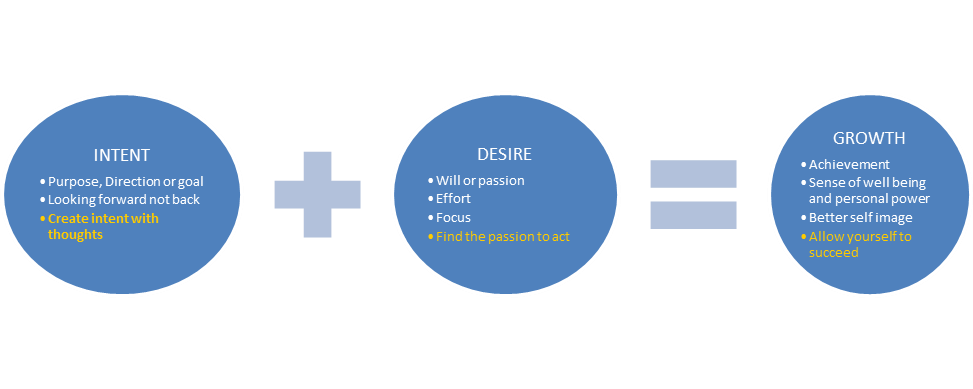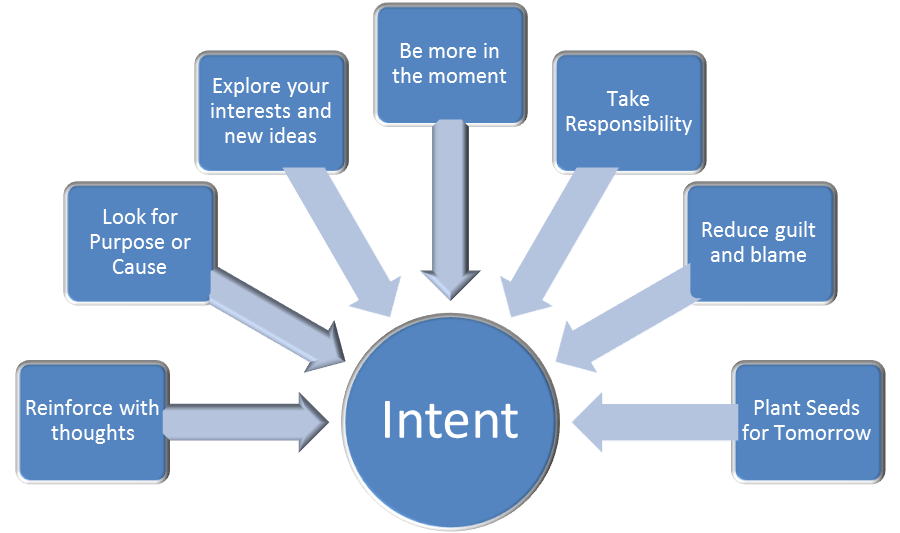Dealing With Strong Emotions Part 2
Intent and Desire
 Intent and Desire
Intent and Desire
Force or effort and direction
When we recognize that ignorance is the problem, the next question is how do we change that for ourselves? We do this by looking within. This can be a challenge as one considers what they should be looking at, and wonders how they should go about doing it. One way to do this is through personal growth, and this starts with our intent and desire.
My perspective on personal growth is that it is far more than just a task, it is a way to enhance our lives. It leads to a happier life, a stronger connection to the world around us and to our continuing to explore, learn and expand ourselves.
Everyone can benefit significantly from personal growth though most choose not to do so or do so at a very slow rate. One’s rate of growth or apparent lack thereof is not the issue, it is about choices rather than right or wrong. Not only is life dynamic and ever changing, we are incarnate on this earth to grow and learn (with the probable exceptions of Buddha, Christ and the like) through our lives.
There is no shame in admitting that we choose to or “need” to grow, it is a truth for all. With every experience we have we learn, and what we learn either benefits or restricts us. Only when we are weak do we resist this notion. We will even insist, if we would admit it at all, that our problems are beyond our control, caused by others or by some outside influence. This is a defense mechanism. Realizing that all people have a measure of growth can help us find the strength to move forward.
We may often look at others feeling or thinking that their lives are fantastic, while ours are not. This may appear to be the case, it is a fallacy; we all have different conditions to deal with. The key in the last sentence is the word different. We are who we are and until we begin to accept ourselves, in whole not in part, until we cease to worry about what others may or may not be doing, growth is difficult.
I urge you to be kind to yourself, to give yourself time to grow. There are enough blocks in this world without us adding to them by beating up on ourselves. It is very important that we take time to appreciate ourselves every day. I cannot stress this enough that by doing so we gain a leg up on the process.
Blame is another mechanism we use, one we must learn to stop using. Why? Besides the fact that it keeps us from accepting personal responsibility and binds us to the energies associated with it, blaming others for our problems or circumstances makes developing the proper intent far more difficult. Inherent in blame is the thought that “since others are to blame they must fix the problems, it is not my responsibility”. Blame is criticism; it takes the responsibility from us. It does not lead us to examine what in us attracted the influence or experience in the first place. This type of thought prevents us from taking an active part in dealing with the aspects of us that draw such experiences so we can reduce and eventually remove them from our lives. This is of critical importance to becoming the person we feel we can be.
How does one go about making the decision to develop oneself, to grow within? This question has as many answers as there are people. No one issue, problem or life situation provides the impetus to proceed. For instance, a series of problems may arise, one significant event has been a trigger that pushes us to grow, or we find we are driven to it from within. Where we find the intent is irrelevant, having it is what matters. For some, finding the intent may be difficult.
One might feel that when serious issues arise one simply goes about fixing it. This presumes one has the intent already, and need not find it. What about those people who have difficulty getting themselves started? There is also hope for those in this category: you must plant the seeds for tomorrow. We do this by setting up a thought process similar to the following: “I will develop the intent, and I will be <you fill in the blank>”. This act starts the process of developing one’s intent to grow.
Some may argue that such a statement does nothing. I would argue this is simply not the case. Over time the thought itself, if continually repeated, will create new thought forms and reduce ones internal resistance. It is not a magic bullet; however, reduced resistance leads to the new thought form taking more prominence. If one can firm up the statement as being a truth for them, wear the clothes so to speak, amazing events can occur. This thought alone, along with the decision to take personal responsibility for our lives, will enable other aspects of the self to find ways to manifest change. The key is in truly accepting and embracing that you need and want to grow. If you are not able to do it at this point, do not give up. Continue to try to focus your intent by how and what you think; it will help you develop the strength to find your intent.
The first part of the growth equation is intent; however, we need more than intent. The purpose or reason for personal growth should not be to appease others or because someone thinks we should or for our ego’s. It should reflect our desire to live life to the fullest. This means trying to be the all we can be so we get the most out of life. You have likely heard this before; it is the selling point for many personal growth or wealth building seminars and books.
For those seeking to develop their spiritual side there is no avoiding personal growth. Even if this is not your goal everyone has aspects of self to work on, there are no exceptions. We can only choose not to do it by our inaction. I am not saying that everyone should focus on it, even though there are huge benefits from it. One needs to be ready for the commitment and consequences changing ourselves has on our lives. Nor is everyone ready for a high level of dedication to the idea.
We often let our lives operate on cruise control, living by the idea “if it ain’t broke don’t fix it”. Your life will tell you whether your growth needs are high or not, the challenge for most is they do not know how to listen to this inner voice. Oddly enough, a good indication of the need to grow occurs when we feel that this is not important at all, or is low on our list of priorities.
We all can benefit from learning more about ourselves; it is the best way to correct problems we feel are hurting us or to lead to a change in our path in life. There is no way for anyone else to correct any problems we may have, it is up to each of us to do this for ourselves. This is a lesson we all must learn. Others can facilitate, encourage, even partially enable, however we are our own best and only source of help. The questions each of us must answer are:
-
Is my life telling me I need to make a change?
-
Do I want to change?
-
What do I need to change?
-
Am I willing to do the work necessary to change?
I cannot understate that commitment is the single most important trait for anyone trying to do serious personal or spiritual growth. When we are young, and before we know any better we tend to abdicate ourselves to the currents of life around. This creates influences that continue for years and over time, they become linked with many other areas of our selves. By then they can be so ingrained in us that at times it seems like we are cutting off a limb by changing. Problems can escalate to the point where they are destroying our lives or breaking our spirits. This makes finding the strength to change one of the largest obstacles before us.
Internally we know when we are having problems we are not correcting, and that we ought to be. At the time, we can convince ourselves otherwise as we may not know how to listen to our lives or lack the will to do so. When the spiral continues down it reduces our will, our internal strength, to the degree that we feel it is too late. This is never the case.
We can always do something, almost without exception, to make things better. This is certainly more difficult when the problem has led to irreversible consequences. For example, if you committed a crime your record will follow you, or if you have suffered an irreversible disability. You may argue that it does not matter anymore because there is no going back, this is a personal choice. Our lives are our own to live though we can choose to give up. Giving up is a form of procrastination. It does not make anything go away, or help problems to disappear. We can try to avoid problems; we can ignore them, circle around them or even move away from them. For a time this may be successful; however, more often than not it comes back to haunt us. Our issues are not the result of external forces; they are of our own making.
We cannot go back, but we can certainly go forward which is where we are going regardless of our choices. We need to make adjustments based on where our lives are now, work on our self-definition, not forgetting what we were, only changing our self-definition to reflect what we have become or are becoming. Children born with permanent disabilities do not experience the same psychological responses of those who take on such a disability later in life. We must find the will or we will continue to suffer. We must find the desire to move forward in the direction of our intent. The question many have is “how do I do this?”
In today’s world, as it has always been, life can get complicated. We can find we have painted ourselves into a corner and do not see a way forward. Focus on the here and now, search for meaning to live in yourself. Try to imagine how you would like it to be and where you would like to be.
We do not arrive at where we are by accident or because someone did something to us. We are where we are because that is where we have put ourselves. Our experiences and reactions to them have led us to where we are. I see this life as being but one in a series of lives all of which contribute to the purpose of waking up our true self. Further, that we choose the life we are born into, where we are born and so forth, to learn lessons we can only learn through living that life. This means that where I am right now must be a necessary part of that journey. At the physical level we ask “why me?” or “what did I do to deserve this life?”, but these questions bind you to guilt and blame and hence to the past, not the possibilities of the future.
No one can find the strength for you. What I can remind you of is that life does have a purpose, that there are reasons to live. Each of us must find the strength within ourselves, our own reason, and then put our spirit behind it. Each of us must find the desire to act, which is why it is the second part of the growth equation.
We want to find the desire to act instead of react. We need this to change and fix what we can, to become more balanced and whole people. Without desire, nothing will happen. Without desire, we are wasting our time. There are reasons for one’s lack of desire, reasons based on our experiences, and reactions to them. At the time of those experiences, we may not have known better, we may have blamed others for our circumstances. Subsequent experiences can further inhibit our desire. We can find and correct the sources of our inhibitions, regardless of the reasons why.
You need desire to get out of bed in the morning, to feed yourself, to do everything. Maybe you mix up desire and reasons; all the same, you do it day in and day out. There is an old saying, “when we are ready to change we do, not before”. The desire to change alone is not enough; as we have touched on already, we also need the intent to change. Either of these alone will not help a great deal. Certainly if we have neither of them, we will likely not get both at the same time. This is not to diminish the importance of eventually acquiring both.
To intend is to have purpose or direction. Force without direction gets us nowhere; the same applies to having a direction without movement or work. In physics, when we define the motion of an object, we can refer to two pieces of information. The first is defining where the object is, its coordinates; the second is its motion, its velocity and direction. By knowing this information and being honest with ourselves, we can predict where it will be at a certain point in time. Applying this to ourselves, we can discern where our lives are going. Without force, we go nowhere, without direction (and there are literally millions to choose from) we are acting randomly and could end up anywhere, just likely not where we would choose. Therefore, the second element required for growth is desire.
Intent and Desire - Summary of Key Elements

Ways to Develop Intent

Ways to Develop Desire
© 2009 Allan Beveridge

